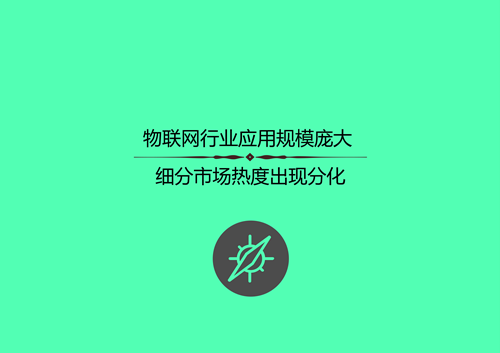In recent years, the Internet of Things has begun to be applied on a large scale in the fields of environmental protection, transportation, security, electricity, logistics, and medical care. People have actually begun to unconsciously feel the changes brought by the Internet of Things to their lives. The Internet of Things such as smart retail and shared bicycles It is in this regard that industry applications have begun large-scale verification. Overall, the popularity of my country’s IoT application market segments has begun to diverge. Industrial Internet of Things, smart cities, Internet of Vehicles, and smart homes have become the four mainstream application market segments.


Market status of China’s Internet of Things industry
The development of my country’s Internet of Things has made great progress against the background of technological progress and policy support. According to statistical data from the “Market Demand and Investment Forecast Analysis Report in the Application Field of the Internet of Things Industry” released by the Qianzhan Industry Research Institute, the industrial scale of the Internet of Things industry jumped from 170 billion yuan in 2009 to more than 750 billion yuan in 2015, with a compound annual growth rate The rate exceeds 25%. It is expected that the scale of my country’s Internet of Things industry will reach 2 trillion by 2020, with a compound growth rate of 22% from 2015 to 2020. The application fields of the Internet of Things are smart grid and industrial monitoring. In 2017, the total sales revenue in the fields of smart grid and industrial monitoring accounted for 83.12% of the company’s operating revenue.
Promoted by both policy and application, the scale of the industrial Internet of Things industry is growing rapidly
In recent years, a number of subdivided industries have emerged in the field of industrial Internet of Things in my country, such as big data companies and unmanned factory solution companies. Currently, there are more than 50 industrial IoT platform companies of various types across the country. As a core technology in the process of industrial transformation, the Internet of Things has broad application prospects in promoting the upgrade of “Industry 4.0”. In 2016, the scale of my country’s industrial Internet of Things reached 189.6 billion yuan, accounting for approximately 18% of the overall Internet of Things industry. It is expected that driven by policy promotion and application demand, the industrial Internet of Things will account for 25% of the overall Internet of Things industry by 2020, and the scale will exceed 450 billion yuan.
Networking promotes upgrading of urban network facilities
The mobile Internet of Things is composed of three technologies: narrowband Internet of Things (NB-IoT), enhanced machine communication technology (eMTC), and fifth-generation mobile communication technology (5G). It is an important means to improve the efficiency of people’s livelihood services and promote the innovation of various data-based intelligent application service models. Currently, it is widely used in smart city construction. Relying on the network characteristics of large bandwidth, large connections, and low latency, 5G technology can realize all-round and three-dimensional intelligent management of cities to improve urban management and service levels.
Investment and cooperation in the Internet of Vehicles market continue, and various provinces and cities are accelerating the layout of the Internet of Vehicles
In 2017, market investment and cooperation continued in the fields of Internet of Vehicles, autonomous driving and related industrial chains. The Ministry of Industry and Information Technology also promptly issued the “Guidelines for the Construction of the National Internet of Vehicles Industry Standard System” with overall requirements and four parts including intelligent connected vehicles, information communications, and electronic products and services, respectively proposing overall construction goals and construction goals in subdivided areas.
Driven by policies, various provinces and cities are accelerating the layout of the Internet of Vehicles. Chongqing has built five leading national industrial platforms, including the “National Public Platform for Internet of Vehicles Supervision and Service”, “National Public Supervision and Service Platform for Road Freight Vehicles”, “Afterlife Service Platform”, “Internet of Vehicles Open Platform” and “Electronic Smart Card System”. At present, the total number of users of the five major platforms has exceeded 20 million.
Smart home is in a stage of explosive growth
In 2014, the market size of my country’s smart home industry reached 29 billion yuan. In 2015, the size of my country’s smart home market reached 40.34 billion yuan, a year-on-year increase of 41%. By 2017, the balance of my country’s smart home market will reach 90.8 billion yuan. The average annual compound growth rate in the next five years (2017-2021) will be approximately 48.12%. The market size will reach 436.9 billion yuan in 2021. Sales of various types of smart single products launched by brands represented by Xiaomi, including smart cameras, smart sockets, and smart door locks, have grown rapidly, and wearable devices have made progress in the fields of personal care and health tracking.